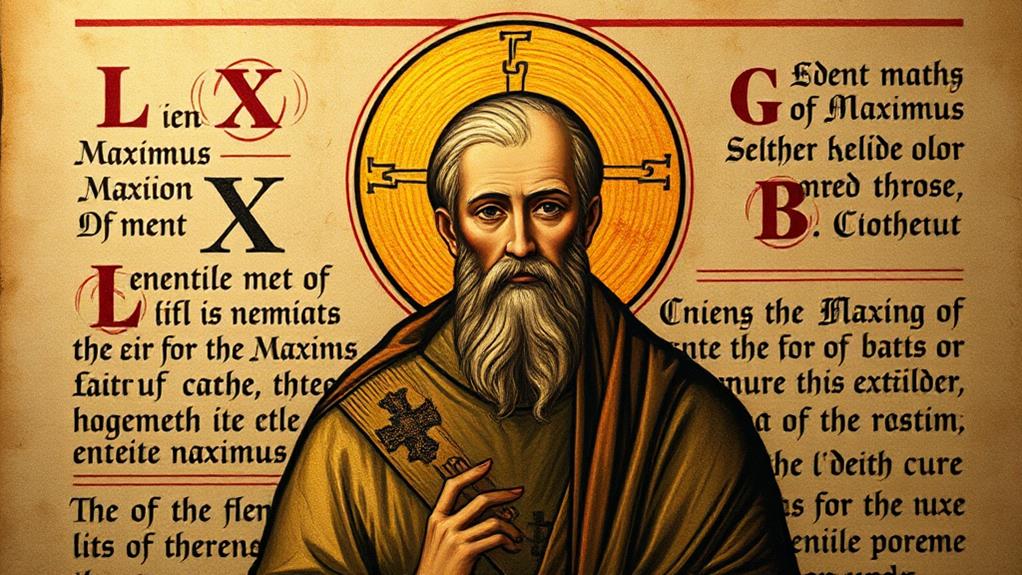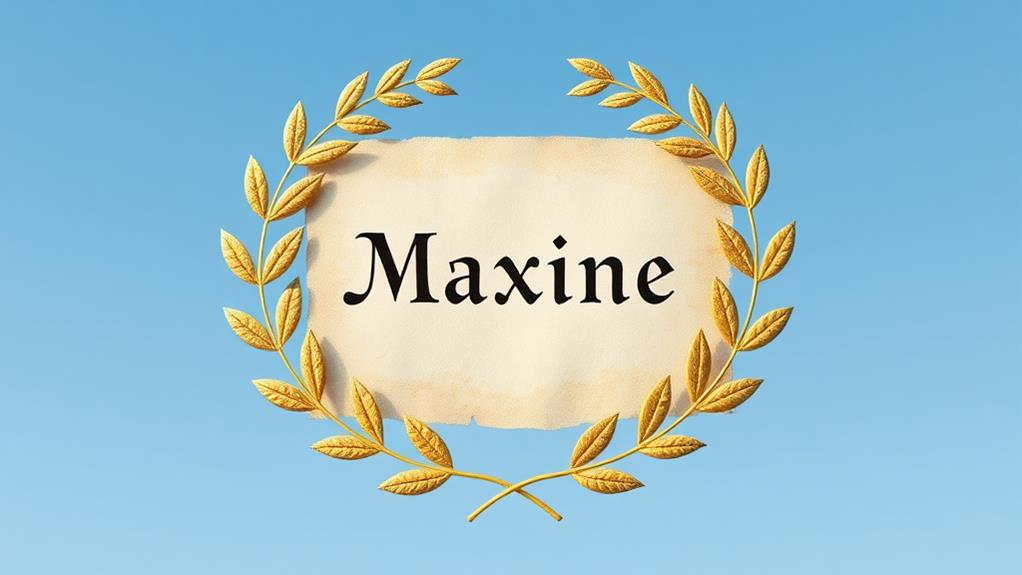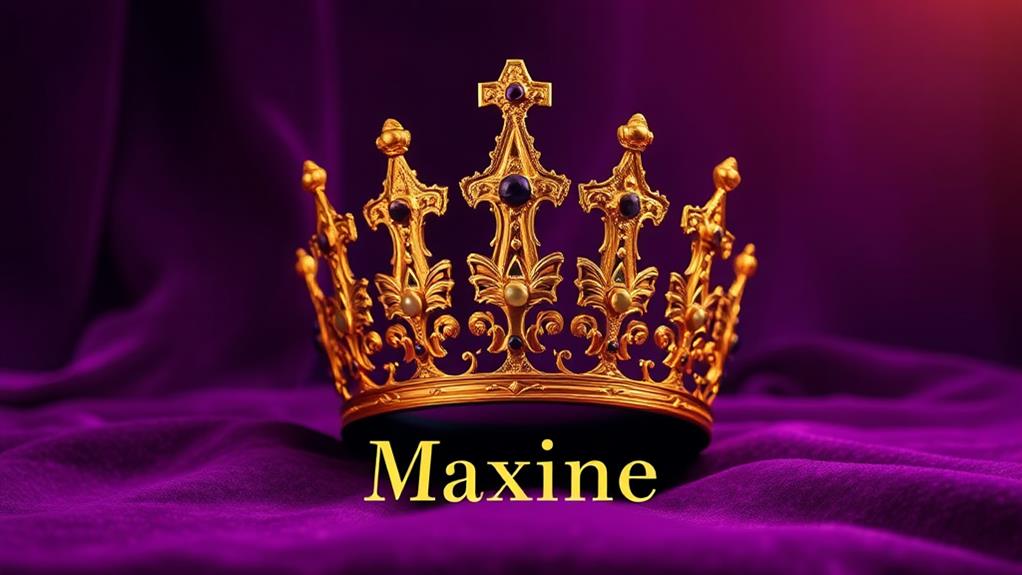Maxine Name Meaning in the Bible
The name Maxine, derived from Latin and specifically from Maximus, meaning “the greatest,” holds profound spiritual significance within Christian traditions. It embodies excellence, moral integrity, and the pursuit of divine purpose, reflecting a commitment to faith and spiritual growth. Although not directly mentioned in the Bible, Maxine’s association with Christian figures like Maximus the Theologian underscores its theological roots. Embracing the virtues of spiritual maturity and the relentless pursuit for self-improvement, Maxine symbolizes a call to trust in God’s plan and strive for loftier ideals. Exploring its historical context and cultural influence reveals even deeper layers of meaning.
Key Takeaways
- The Name’s Origin: Maxine originates from Latin, specifically from Maximus, which means “the greatest.”
- Christian Association: Maxine indirectly links to Christian traditions through figures like Maximus the Theologian, reflecting Christian virtues and ideals.
- Spiritual Meaning: Maxine symbolizes the pursuit of excellence, spiritual growth, and the quest for self-improvement and enlightenment.
- Biblical Connection: Although Maxine is not directly mentioned in the Bible, its Latin roots and association with Christian figures make it historically and culturally significant.
- Cultural and Historical Significance: The name’s symbolism of greatness, nobility, and excellence resonates with Christian values and virtues, showcased by notable figures like Maxine Hong Kingston and Maxine Waters.
Latin Origin and Biblical Significance

The name Maxine, although commonly associated with Christian traditions, does not have a direct biblical origin. Instead, it derives from Latin origins, specifically from the name Maximus, which means “the greatest.” This Latin root is essential in understanding the significance and meaning of the name Maxine.
In the context of Christianity, the name Maxine can be indirectly linked to its Latin origins, which were later adopted and revered in Christian contexts. For example, Maximus the Theologian, also known as Maximus of Constantinople or Maximus the Confessor, was a prominent Christian scholar and theologian.
The name Maximus, with its Latin origins, has been adapted into various forms, including Maxine, which has been popularized as a feminine counterpart.
Despite lacking direct biblical roots, Maxine’s Latin origins and its association with Christian figures make it a name rich in historical and cultural significance. The name’s meaning, “the greatest,” adds a layer of depth and inspiration, making it a meaningful choice for parents seeking a name with profound historical undertones.
Maxine and Christian Figures
Maxine, a name deeply rooted in Latin origins, finds an indirect link to Christian traditions through its association with prominent Christian figures. The name Maxine, derived from Maximus, resonates with the legacy of Maximus the Theologian, also known as Maximus of Constantinople or Maximus the Confessor, a revered Christian scholar, monk, and theologian who was recognized in both the Catholic and Eastern Orthodox Churches. His contributions to Christian theology underscore the name’s connection to the faith.
However, it is important to note that there are no direct references to Biblical characters named Maxine in the Bible. Instead, the name’s role in Christian teachings is more symbolic, reflecting the virtues and values associated with its Latin origin, meaning “the greatest.” This conveys a message of striving for excellence and moral greatness, aligning with Christian teachings on humility and perseverance.
Through its association with historical Christian figures and its intrinsic meaning, Maxine embodies a profound connection to Christian ideals, making it a meaningful choice for parents seeking a name with spiritual significance.
Theological Roots of Maxine

The name Maxine has its theological roots in the Latin word “maximus,” meaning “the greatest,” which is associated with prominent Christian figures like Maximus the Theologian, also known as Maximus of Constantinople or Maximus the Confessor. This foundational connection underscores the significance of Maxine as a name that embodies virtues and values revered in Christian tradition.
Additionally, similar to the name Robert, which symbolizes strength and leadership, Maxine reflects a profound commitment to faith and moral integrity. Through its historical linkage to the name Maximus, Maxine carries a profound theological meaning that resonates with believers and scholars alike, emphasizing concepts of greatness and divine purpose as seen in biblical associations.
Theological Name Origin
An etymology exploration of Maxine highlights its derivation from Maximus, embodying the essence of “the greatest” in both spiritual and symbolic interpretations. This name, as a result, carries a profound significance, reflecting the values of excellence and virtuousness that are central to Christian theology.
The use of Maxine as a feminine form of Maximus not only preserves the original Latin meaning but also extends its symbolic significance to encompass feminine virtues. This connection to Maximus the Theologian further enriches the name’s theological context, underscoring its association with Christian scholarship and religious dedication. Through this origin, Maxine emerges as a name that embodies both historical depth and spiritual significance.
Biblical Name Significance**
While exploring the theological roots of names can often lead to complex and nuanced understandings, examining the name Maxine reveals a straightforward yet profound connection to Christian theology. The name Maxine originates from the Latin name Maximus, which means “greatest” and is closely associated with Christian figures like Maximus the Confessor, a prominent Christian scholar and theologian of the 7th century. This association underscores the virtues of diligence and purposeful living, much like those reflected in the name Amelia, which embodies a commitment to ethical endeavors and hard work symbolism and characteristics of Amelia.
In terms of biblical name significance, Maxine does not directly appear in the Bible but inherits its meaning and essence from the Latin root Maximus. This root symbolizes greatness and nobility, reflecting qualities of biblical characters who demonstrated significant faith and resilience. The adoption of names like Maxine can be seen as a form of honoring the legacy of these figures and their contributions to Christian theology.
The name Maxine, with its Latin origins and Christian associations, embodies a strong symbolic meaning that resonates with Christian values. It serves as a reminder of the importance of spiritual greatness and faith, inspiring those who bear this name to aspire to these virtues. This understanding enhances the name’s significance, making it a meaningful choice for parents seeking names with deep theological roots.
Maxine in Early Christianity
Maxine’s connection to early Christianity stems from its association with Maximus, a name derived from the Latin word “maximus,” meaning “the greatest.” This name is often linked to biblical themes of greatness and divine favor, much like the name Ashley, which symbolizes strength and resilience.
Maximus the Theologian, also known as Maximus of Constantinople or Maximus the Confessor, was a Christian scholar, monk, and theologian who is revered in both the Catholic and Eastern Orthodox Churches. This historical figure played a significant role in shaping early Christian thought and his name symbolizes the highest virtues of faith and intellect. symbolizing strength and resilience.
Early interpretations of the name Maxine emphasize its link to the concept of greatness, as embodied by Maximus. This name reflects the values of early Christianity, which sought to represent the highest ideals of divine and human excellence.
While there are no direct biblical references to Maxine, its connection to Maximus provides a strong affinity with the theological and ethical principles of early Christianity. The name Maxine thereby carries a profound historical and spiritual significance, symbolizing the pursuit of spiritual greatness and the emulation of virtuous lives.
This legacy continues to inspire, offering a name that is both deeply rooted and profoundly meaningful.
Spiritual Meaning of Maxine

The spiritual meaning of Maxine is deeply intertwined with its historical and theological roots, drawing from the same Latin origin that gives rise to the name Maximus. This name, meaning “greatest,” serves as a profound reminder of the pursuit of excellence and the embodiment of superior qualities.
In the context of personal growth and spiritual journey, Maxine symbolizes the relentless quest for self-improvement and spiritual enlightenment. The journey towards spiritual maturity, as emphasized in biblical teachings, reflects the call to embrace divine guidance and trust in God’s plan, encouraging individuals to cultivate unity and harmony in their lives, aligning with divine principles.
As individuals journey through life, the name Maxine inspires them to strive for greatness, not in a mundane sense, but in the pursuit of spiritual and moral excellence. It encourages a path of self-reflection, resilience, and the cultivation of virtues that align with the highest human ideals.
The spiritual essence of Maxine is rooted in the concept of maximus, urging individuals to recognize and nurture their innate potential, thus initiating on a transformative journey of personal and spiritual growth. This name embodies the essence of a deeply fulfilling and meaningful existence, one that is guided by the principles of virtues and the pursuit of greatness in all facets of life.
Symbolism of the Name Maxine
The name Maxine, rooted in Latin and derived from Maximus, carries a profound symbolic meaning that reflects greatness and excellence.
In a biblical context, while Maxine does not directly appear in the Scripture, its underlying concept of “the greatest” resonates with Christian virtues of aiming for moral and spiritual greatness.
This name symbolizes the aspiration for superior qualities, echoing the reverence for wisdom and strength found in biblical teachings.
Origin and Biblical Connection
In theological symbolism, the name Maxine conveys the concept of greatness and excellence, reflecting a spiritual aspiration towards magnanimity and lofty ideals. The biblical connection, though indirect, is profound, as it aligns with the Christian values of aiming for the highest virtues and ethical standards.
While Maxine does not appear directly in the Bible, its roots in the Latin *maximus* offer a compelling link to the broader theological themes of greatness, nobility, and divine excellence. This cultural and theological interplay enriches the name Maxine with deeper spiritual meanings, making it a resonant choice for those seeking names with profound religious significance.
Symbolic Meanings Explained**
Maxine’s symbolic meanings are deeply intertwined with its origins from the Latin name Maximus, conveying excellence, nobility, and greatness. This name is not only historically significant but also carries profound biblical symbolism. In the context of biblical teachings, excellence and nobility are qualities often associated with spiritual leaders and those who embody Christian virtues.
Cultural interpretations further enhance the symbolic significance of Maxine. The name’s connection to Maximus the Theologian, a revered Christian scholar and monk, underscores its association with spiritual allegories of Christian theology and the embodiment of greatness in faith.
Historically, Maximus was recognized by both the Catholic and Eastern Orthodox Churches as a Father of the Church, highlighting the name’s depth in historical context.
The essence of Maxine reflects attributes of spiritual leadership and devotion, encouraging those who bear it to aim for excellence and spiritual nobility. This biblical symbolism, embedded in the name’s origins, communicates a sense of purpose and guidance, providing a rich cultural and historical context that resonates deeply with Christian beliefs and teachings.
Biblical Influence on Maxine

A profound exploration of the name Maxine from a biblical perspective reveals a rich tapestry of influences and meanings. While Maxine itself is not directly mentioned in the Bible, its origins and spiritual interpretations offer a compelling narrative.
The name Maxine is derived from the Latin name Maximus, meaning “greatest,” which aligns with scriptural themes that emphasize pursuing for greatness in faith and moral character.
Biblical references to names with similar meanings underscore the importance of living a life of excellence and devotion. For instance, the name Maximus resonates with the Christian maxim to seek greatness in humility and service.
Modern relevance of the name Maxine is found in its association with qualities such as strength, courage, and leadership, which are deeply rooted in biblical teachings. The spiritual interpretation of Maxine encourages individuals to strive to greatness in their spiritual journeys, making it a name that inspires and motivates those who bear it.
Through its biblical influence, Maxine becomes more than just a name; it is a call to embody the virtues of faith and moral excellence.
Historical Figures Named Maxine
Maxine has been the name of numerous influential figures throughout history. Maxine Elliott, an American actress, played a pivotal role in popularizing the name in the late 19th and early 20th centuries.
Maxine Hong Kingston, a Chinese-American author, has made a significant contribution to contemporary literature.
Maxine Waters, a U.S. Congresswoman from California, has been a prominent figure in American politics, advocating for civil rights and social justice. These individuals, among others, have shaped the cultural and social landscape, demonstrating the name’s wide-reaching influence beyond its etymological roots.
The impact of these figures extends beyond their own achievements, as they inspire others and influence art, literature, and social movements. Their influence on art and culture demonstrates how names, even those without direct biblical roots, can carry potent meanings and shape societal narratives.
Christian Values in the Name Maxine

Considering the etymology and historical context of the name Maxine, it is intriguing to explore how it aligns with Christian values. The name Maxine, derived from the Latin name Maximus, meaning “the greatest,” inherently embodies virtues that are central to Christian teachings. Maximus the Theologian, a renowned Christian scholar and monk, exemplifies these faith values through his devotion and unwavering commitment to his beliefs.
The name Maxine reflects key principles of virtue ethics, such as integrity and courage, which are cherished in Christian tradition. Maximus, revered in both the Catholic and Eastern Orthodox Churches, demonstrates these virtues through his life of self-sacrifice and perseverance. His title “Confessor” underscores his steadfast faith and endurance in the face of adversity, illustrating the profound Christian values associated with the name Maxine.
In incorporating these faith values and virtue ethics, the name Maxine serves as a powerful reminder of the importance of living with integrity and moral fortitude, aligning closely with core Christian teachings. This alignment provides a timeless and inspiring context for understanding the name Maxine, beyond its literal meaning, deep into its spiritual and ethical dimensions.
Cultural Significance of Maxine**
The cultural landscape of the 20th century played an essential role in the popularity and cultural significance of the name Maxine. Originating from Latin, Maxine means “the greatest,” reflecting its strong and empowering essence. The name’s modern interpretations are deeply interconnected with its historical roots, showcasing a blend of classic and contemporary appeal.
Cultural evolution has greatly influenced the perception and usage of the name Maxine. From its peak in the early 20th century to its revival in recent years, Maxine has traversed various cultural contexts. The name has been popularized by celebrities such as Maxine Andrews of the Andrews Sisters and has appeared in various artistic works, including songs by Eminem and Sharon O’Neill.
In modern interpretations, Maxine is seen as a symbol of strength, independence, and versatility. Its cultural significance extends beyond its etymology, embodying the spirit of women who possess these qualities. As a name that has evolved through time, Maxine continues to inspire parents seeking a name that combines tradition with a contemporary edge. Through its cultural evolution, Maxine has secured a place in the hearts of many, reflecting its enduring appeal and relevance.
Frequently Asked Questions
What Are Common Nicknames for the Name Maxine?
Maxine, a timeless classic, retains its enduring popularity with versatile nicknames. Common diminutive forms include Max, Maxi, Maxie, and Mad Max, offering a range of informal and affectionate options. These variations emphasize the name’s adaptable and charming nature.
Is Maxine a Popular Name in Contemporary Society?
As the world awakens to vintage charm, Maxine stands poised, its revival unfolding. But is it popular? Yes, Maxine has re-entered the spotlight, ranking #513 in U.S. births in 2023, defying its biblical absence to become a sought-after name in modern culture.
How Is the Name Maxine Pronounced Correctly?
The name Maxine is pronounced correctly as /mækˈsin/ (mak-seen). Common mispronunciations include Ma-ks-seen and Max-ine. Regional variations and cultural influences may lead to slight differences in pronunciation, such as /mækˈsin/ in American English and /mæksɪn/ in some regional dialects.
Does Maxine Have Any Variations in Spelling?
Are you seeking a unique twist on a timeless name? Maxine variations include Maksine, Macksine, and Macksinne, with historical origins in Latin and Scottish cultures, symbolizing “greatest” and “Mack’s stream,” respectively, devoid of direct Biblical connections.
What Are Some Famous Women Named Maxine?
Prominent Maxines include Maxine Waters, the U.S. Congresswoman, Maxine Hong Kingston, a Pulitzer Prize-winning author, and Maxine Peake, a British actress. Additionally, Maxine has been featured as a character name in various TV series like “Stranger Things” and “Hollyoaks”.
Conclusion
Maxine, a name rooted in Latin and linked to the Christian theological tradition, conveys the essence of “the greatest.” Derived from Maximus, it is a name that embodies strength, courage, and divine blessings. Historical figures, like Maximus the Confessor, underscore the name’s spiritual significance. Maxine’s enduring popularity reflects its profound meaning, making it a timeless choice for those seeking a name with deep Christian roots. Like an ancient scroll rediscovered, Maxine’s timeless essence unfolds, inspiring generations anew.
[References:
- Kidpaw: Maxine Name Meaning in English
- The Bump: Maxine Baby Name Meaning, Origin and Popularity
- MomJunction: Maxine Name, Meaning, Origin, History, And Popularity]






